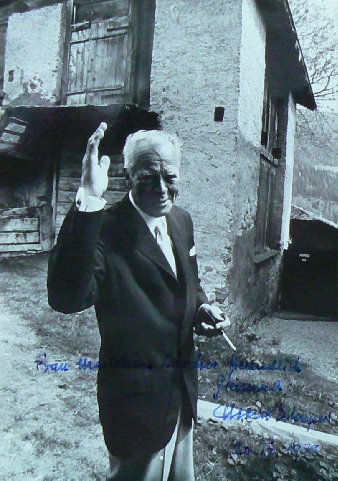| Home |
| Home |

(1908 - 1984) Sentenced to Death, Destined to Live |
 The
writer Edzard Schaper got piano lessons at the Conservatory for Music and
in 1925 he became a director assistant at the opera in Stuttgart.
The
writer Edzard Schaper got piano lessons at the Conservatory for Music and
in 1925 he became a director assistant at the opera in Stuttgart.
But he soon moved to Denmark where he lived on the island Christianso till 1929. At that time he realised his first writing works, among others "Der letzte Gast" (27) and "Die Bekenntnisse des Försters Patrik Doyle" (28).
Afterwards Edzard Schaper carried different jobs like gardener subworker and as a sailor.
He went to Estonia in 1932 because he met his future wife Alice Pergelbaum
in Berlin before who was living in Estonia. He domilicated there and worked
as a freelancing journalist and writer for the American news agancy United
Press.
In Estonia he wrote his first successful novel with "Die Insel Tütarsaar"
(33), "Erde über dem Meer" (34), "Die sterbende Kirche" (35) and "Der
Henker" (40).
His books were als published in Germany although he already was blackballed
from the Reichsschrifttumskammer in 1936 and his books were forbidden in
fact.
The political turbulences in Europe did not pass by him without impact. When the Sovjets occupied Estonia he had to flee to Finland in 1940 because of his employment by the United Press where he worked as a war correspondent and reported about the Sovjet invasion.
In Finland he was under supervision by the police, finally the political
situation grew more acute and the German embassy revoked his passport and
started a proceeding against him. The accusation: to abdicate from the
responsibility for the military service and support of the enemy during
a war.
Edzard Schaper was sentenced to death in absentia.
In September 1944 Edzard Schaper suceeded the escape to Sweden where he hide for the next three years and worked as a lumberjack and a helper for a hospital.
Only in 1947 his life came back to the normal and to safety when friends
of him enabled the entry to Switzerland.
Now he was able to dedicate to his writing skills completely and he
published numerous novel in the next years, at the same time he sticked
up for the now occupied countries Estonia, Latvia and Lithuania with his
essay "Auch wir sind Europa".
To his novels of those years belong "Der letzte Advent" (49), "Die Freiheit des Gefangenen" (50), "Die Macht der Ohnmächtigen" (52), "Der Gouverneur oder Der glückselige Schuldner" (54), "Die letzte Welt" (56), "Attentat auf den Mächtigen" (57) and "Das Tier oder Die Geschichte eines Bären, der Oskar hiess" (58).
To his last literary creations belong "Der vierte König" (61), "Der Aufruhr des Gerechten" (63), "Am Abend der Zeit" (70), "Taurische Spiele" (71), "Sperlingsschlacht" (72), "Degenhall" (75) and "Die Reise unter den Abendstern".
Some books of Edzard Schaper were adapted for television with "Der Gefangene der Botschaft" (64) with Mathias Wieman, Willy Birgel, Peter Arens and Annemarie Blanc as well as "Attentat auf den Mächtigen" (69) with Claudia Wedekind, Volker Brandt and Harry Wüstenhagen.
To Edzard Schaper's numerous awards belong the Fontane-Preis of Berlin, the Charles-Veillon price, the Gottfried-Keller price and the Gold Medal of the Humboldt assosciation plus the Konrad-Adenauer price for literature.